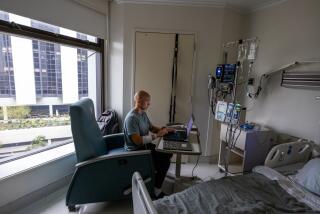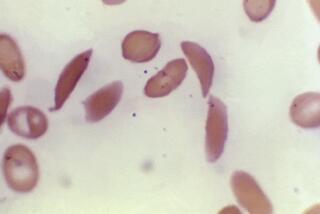FDA approves historic ‘living drug’ treatment to fight childhood leukemia

The FDA approved a “living drug” that’s highly effective at fighting an aggressive form of leukemia in young patients. (Aug. 31, 2017)
Opening a new era in cancer care, the Food and Drug Administration on Wednesday approved the first treatment that genetically engineers patients’ own blood cells into an army of assassins to seek out and destroy childhood leukemia.
The CAR-T cell treatment developed by Novartis Pharmaceuticals Corp. and the University of Pennsylvania is the first type of gene therapy to hit the U.S. market — and one in a powerful but expensive wave of custom-made “living drugs” being tested against blood cancers and some tumors.
FDA called the approval historic.
“This is a brand new way of treating cancer,” said Dr. Stephan Grupp of Children’s Hospital of Philadelphia, who treated the first child with CAR-T cell therapy, a girl who had been near death but now has been cancer-free for five years. “That’s enormously exciting.”
CAR-T treatment uses gene therapy techniques not to fix disease-causing genes but to turbocharge T cells, immune system soldiers that cancer too often can evade. Researchers filter those cells from a patient’s blood, reprogram them to harbor a “chimeric antigen receptor” that zeroes in on cancer, and grow hundreds of millions of copies. Returned to the patient, the revved-up cells can continue multiplying to fight disease for months or years.
Novartis said it would charge $475,000 for the treatment, made from scratch for every patient. But the company said there would be no charge if the patient didn’t show a response within a month.
“We’re entering a new frontier in medical innovation with the ability to reprogram a patient’s own cells to attack a deadly cancer,” FDA Commissioner Scott Gottlieb said.
This first use of CAR-T therapy is aimed at patients desperately ill with a common pediatric cancer — acute lymphoblastic leukemia — that strikes more than 3,000 children and young adults in the U.S. each year. While most survive, about 15% relapse despite today’s best treatments, and their prognosis is bleak.
In a key study of 63 advanced patients, 83% went into remission. It’s not clear how long that benefit lasts: Some patients did relapse months later. The others still are being tracked to see how they fare in the long term.
Still, “a far higher percentage of patients go into remission with this therapy than anything else we’ve seen to date with relapsed leukemia,” said Dr. Ted Laetsch of the University of Texas Southwestern Medical Center, one of the study sites. “I wouldn’t say we know for sure how many will be cured yet by this therapy. There certainly is a hope” that some will be.
Most patients suffered side effects that can be grueling, even life-threatening. An immune overreaction called cytokine release syndrome can trigger high fevers, causing plummeting blood pressure and, in severe cases, organ damage, requiring special care to tamp down those symptoms without blocking the cancer attack. Also Wednesday, the FDA designated a treatment for those side effects.
The new CAR-T therapy might replace bone marrow transplants that cost more than half a million dollars, said Grupp, who led the Novartis study.
“I don’t want to be an apologist for high drug prices in the U.S.,” Grupp stressed. But if it’s the last treatment they need, “that’s a really significant one-time investment in their wellness, especially in kids who have a whole lifetime ahead of them.”
Initially, Novartis’ CAR-T version — to be sold under the brand name Kymriah — will be available only through certain medical centers specially trained to handle the sophisticated therapy and its side effects. Patients’ collected immune cells will be frozen and shipped to a Novartis factory in New Jersey that creates each dose, a process the company says should take about three weeks.
While this first use of CAR-T therapy only is aimed at a few hundred U.S. patients a year, it’s being tested as a treatment for thousands more.
Kite Pharma Inc.’s similar CAR-T brand, developed by the National Cancer Institute, is expected to win approval later this year to treat aggressive lymphoma, and Juno Therapeutics and other companies are studying their own versions against blood cancers including multiple myeloma.
On Monday, Gilead Sciences Inc. announced that it was buying Santa Monica-based Kite in an $11.9-billion deal.
Analysts said the eventual pricing of the Novartis treatment could be an advantage for Kite.
Since these therapies are “unbelievably effective” for leukemia, Novartis’ pricing power is high, said Thomas Shrader, biotechnology analyst at Stifel. That means Kite could piggyback off Novartis’ price, even though its therapy is aimed at non-Hodgkin’s lymphoma, which has a lower response rate to the therapy than leukemia does.
Scientists around the country also are trying to make CAR-T therapies that could fight more common solid tumors such as brain, breast or pancreatic cancers — a harder next step.
Times staff writer Samantha Masunaga contributed to this report.
ALSO
FDA cracks down on clinics selling unproven stem cell ‘therapies’
UPDATES:
9:55 a.m.: This article was updated with the price of Novartis’ therapy.
9:45 a.m.: This article was updated with comments from medical experts and a financial analyst, as well as more details about CAR-T therapy.
This article was originally published at 8:25 a.m.






